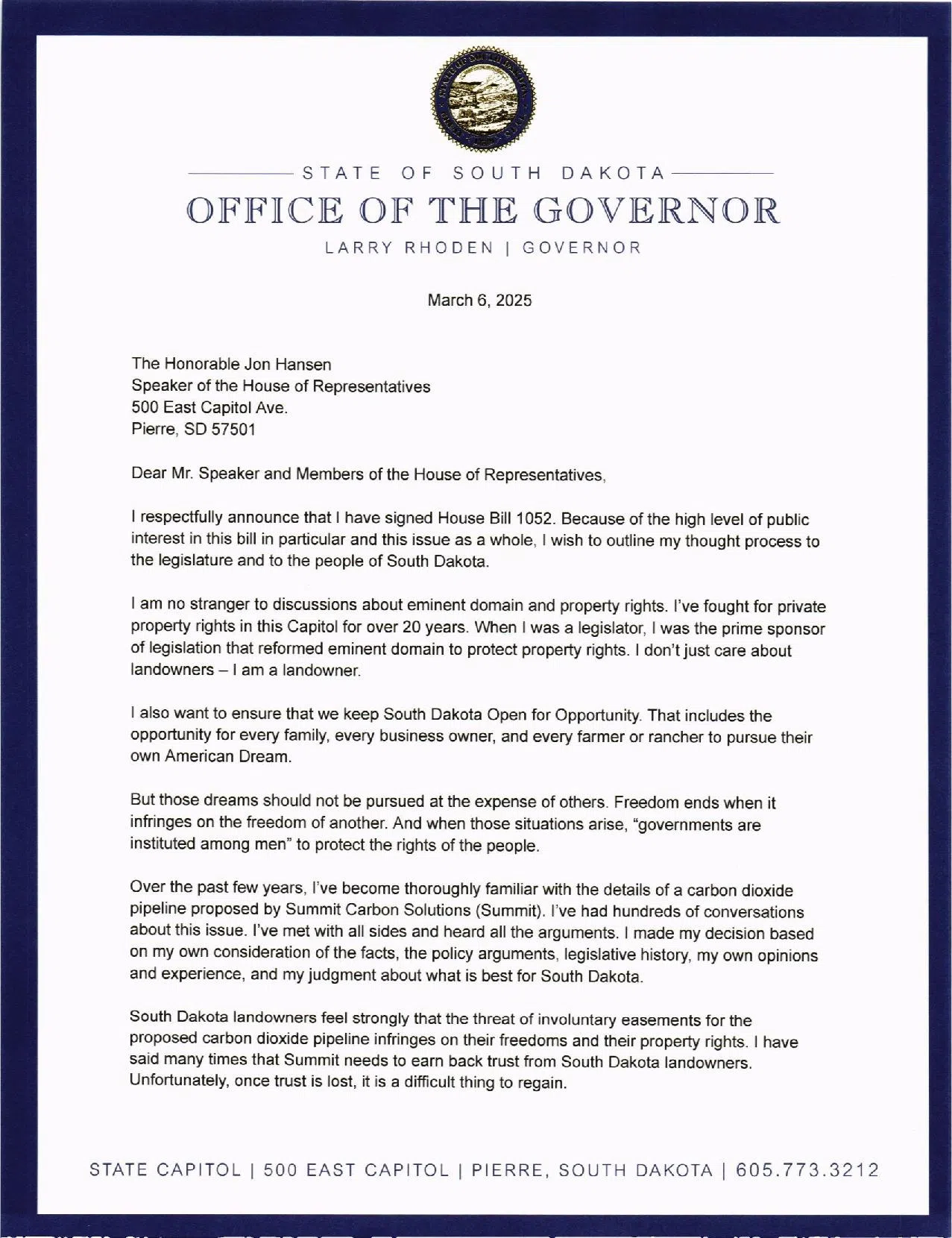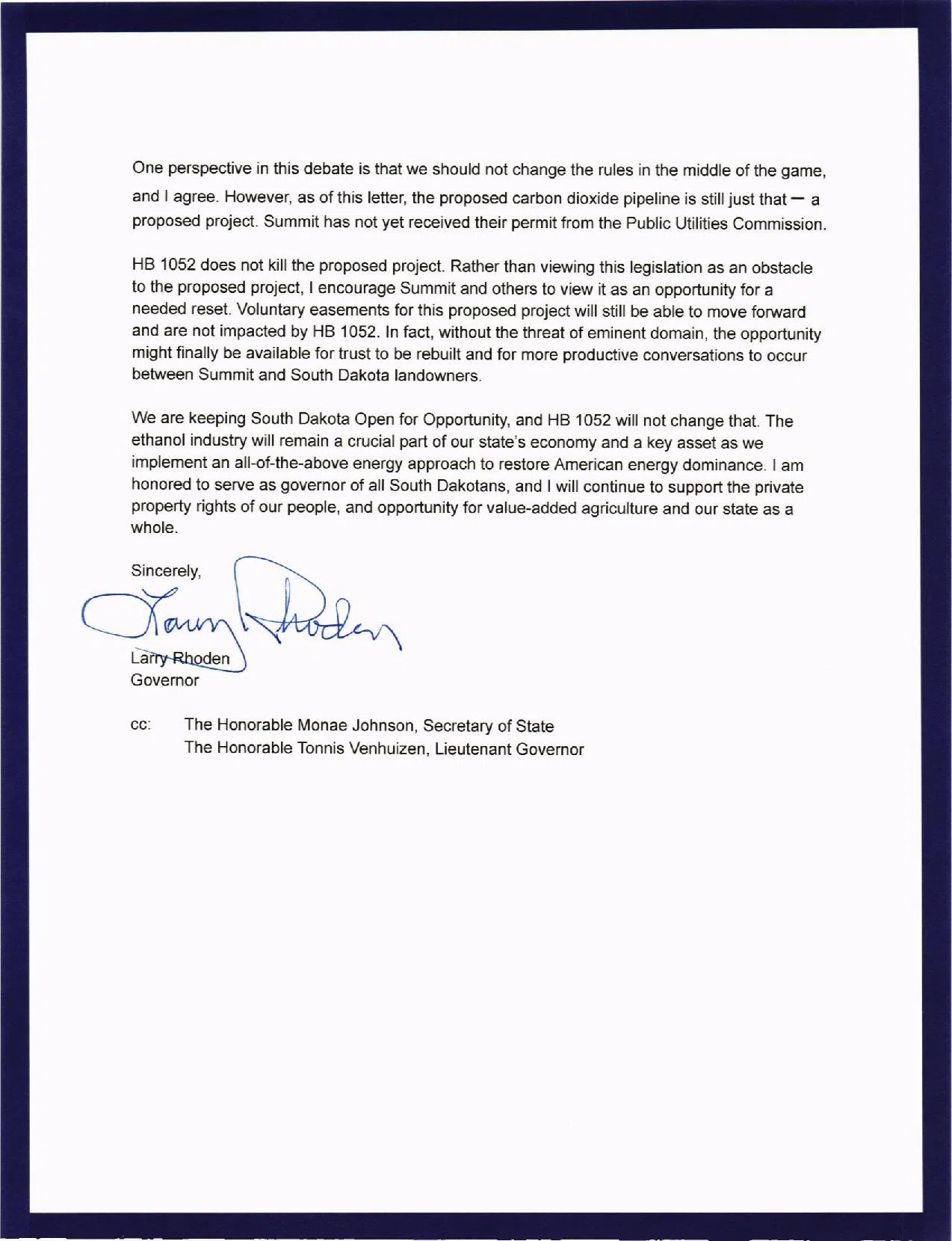March 12, 2025:
SIOUX FALLS, S.D. (AP) — The company behind an $8.9 billion carbon-capture pipeline proposed for five Midwestern states said Wednesday it wants to indefinitely delay its plans after South Dakota passed a law limiting its ability to acquire land for the project.
But even as it filed a motion to suspend its pipeline permit application timeline with the South Dakota Public Utilities Commission, the Iowa-based Summit Carbon Solutions said it remains committed to the pipeline.
Summit attorney Brett Koenecke said the action was needed because the legislation approved by South Dakota lawmakers and quickly signed into law by the governor changed the company’s ability to survey the route.
“The resulting delays in obtaining the surveys mean that the timelines involved in Commission action on this application are unrealistic,” Koenecke wrote in the motion. If the commission approves the motion, they can set a new deadline for the permit application.
The proposed 2,500-mile pipeline would carry carbon emissions from ethanol plants in Iowa, Minnesota, Nebraska, North Dakota and South Dakota to be stored underground permanently in North Dakota. By lowering carbon emissions from the plants, the pipeline would lower their carbon intensity scores and make them more competitive in the renewable fuels market.
The project had approvals in Iowa, Minnesota and North Dakota. But in South Dakota, a new law banned the use of eminent domain — the government seizure of private property with compensation — specifically for carbon-capture projects.
The eminent domain bill sponsor Republican Rep. Karla Lems said Summit is “trying to get their feet back under them” after the eminent domain ban.
Summit’s move was “generally good news” for Frank James, director of advocacy group Dakota Rural Action, which opposed allowing eminent domain for the project.
“It means the work that we did at the legislature with our allies was impactful,” he said. “It clearly shows the citizens of South Dakota really question these false solutions to climate change.”
Tad Hepner, vice president of strategy and innovation at the Renewable Fuels Association, disagreed, saying stopping Summit in South Dakota would put ethanol producers in the state at a competitive disadvantage to out-of-state plants connected to the pipeline.
“We don’t want to see haves and have-nots,” he said. “We want as many ethanol producers to be able to sequester their CO2 as possible.”
North Dakota Gov. Kelly Armstrong said Tuesday he doesn’t know how Summit will get its pipeline into North Dakota given South Dakota’s eminent domain ban.
Armstrong said he is concerned because officials and industry leaders were hopeful of eventually using carbon dioxide to extract oil. North Dakota is the No. 3 oil-producing state in the country, producing about 1.2 million barrels of oil per month.
Summit has already spent more than $1 billion on the project, Summit spokesperson Sabrina Zenor said. Despite the South Dakota suspension, “all options” are still on the table, the company said.
“Summit Carbon Solutions remains committed to working through this process and advancing the project in states that support energy and innovation,” the company said in a statement.
March 6, 2025:
South Dakota Governor Larry Rhoden signed a bill (March 6, 2025) that takes the eminent domain option away from companies wanting to build a carbon capture pipeline in the state.
However, Rhoden also emphasized that House Bill 1052 does not kill a pipeline project proposed by Iowa-based company Summit Carbon Solutions.
HB 1052 was a direct response from pipeline opponents frustrated by the actions of Summit Carbon Solutions. They said Summit employees have conducted land surveys without permission and have used misleading information to get landowners to sign leases allowing Summit’s proposed pipeline to be built across their property.
Rhoden said Summit needs to earn back the trust of South Dakotans, which he admits won’t be easy.
Rhoden outlined his reasons for signing the bill in a letter to the legislature and people of South Dakota.
Summit’s proposed pipeline project would connect ethanol companies in Iowa, Minnesota, South Dakota and North Dakota to an underground storage site in southwestern North Dakota.


March 4, 2025:
The South Dakota Senate has passed (March 4, 2025) a bill that takes the eminent domain option away from companies wanting to build a carbon capture pipeline.
House Bill 1052 passed by a 23-12 vote.
The bill was a direct response from pipeline opponents frustrated by the actions of Summit Carbon Solutions. They said Summit employees have conducted land surveys without permission and have used misleading information to get landowners to sign leases allowing Summit’s proposed pipeline to be built across their property.
Bill co-sponsor Sen. Mark Lapka of Leola pushed back on claims that the measure would stop Summit’s project saying it would lead to more even-handed negotiations.
Sen. David Wheeler of Huron tried to amend the bill to allow eminent domain to be used if company wanting to build the carbon capture pipeline has a permit from the Public Utilities Commission and 75% of the landowners voluntarily sign easements. He said carbon capture pipelines should not be treated differently from other utilities.
That amendment failed.
HB 1052 is now headed to Gov. Larry Rhoden’s desk. A spokeswoman for Rhoden said he will contemplate signing the measure over the next several days.
The Iowa-based Summit Carbon Solutions wants to build roughly 2,500 miles of pipeline connecting ethanol plants in eastern South Dakota to underground storage in North Dakota.
The South Dakota Broadcasters Association contributed to this story.
January 28, 2025:
(South Dakota Broadcasters Association)— The South Dakota House voted 49-19 Monday (Jan. 27, 2025) to ban the use of eminent domain to acquire right-of-way for carbon oxide pipelines.
“South Dakota is open for business, but not at the expense of South Dakota citizens’ rights,” said bill sponsor Rep. Karla Lems, R-Canton. “Like has been mentioned, in Minnesota, they cannot use eminent domain for this project,” she added. “And guess what? They are getting it done. Property rights should never be controversial. Let’s put the key to property ownership back into the hands of the property owner.”
Representative Julie Auch, R-Yankton, also spoke in support of the bill.
“I, too, have traveled all over the state and spoken with several farmers, ranchers, myself, a farmer included, in reference to Referred Law 21, who I’m sure everyone in this room recognizes,” Auch said. “This bill is not preventing any kind of a company from doing business in this state. It’s just basically saying, if we say no thank you, that means no thank you.”
Opponents of House Bill 1052 argued that the measure could harm economic development.
Rep. Tim Reisch, R-Howard, argued that a planned $1.5 billion GEVO plant in his district east of Lake Preston would need a carbon pipeline.
“The taxes generated by this plant will greatly benefit local governments, schools, counties that are hurting,” Reich said. “Every ethanol plant in South Dakota supports the pipeline’s construction.”
Rep. Mike Stevens, R-Yankton, also speaking in opposition, said the pipeline benefits extend beyond private companies.
“That ethanol plant does a benefit for the public because they hire people in Scotland that would otherwise have to find other employment. Stevens said. “They get paid a salary so they can stay in their small community and raise their children in a community that they want to be at.”
The bill now moves to the Senate.







Comments